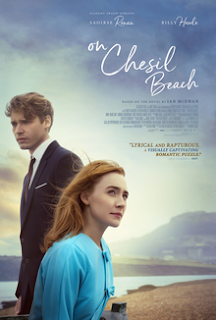‘On Chesil Beach’ Ian McEwan’s book and film script
Reading Time: 4 minutes

IAN McEWAN’S ‘ON CHESIL BEACH’
BOOK ADAPTED TO FILM
‘On Chesil Beach’ was published in 2007. Ian McEwan’s 166 page novelette (short enough to be read in one long sitting or over a reasonably busy weekend) continues to be applauded for its insightful portrayal of a frightened young virgin couple on their wedding night in 1962.
The story is told by both Frances and Edward (the young couple), enabling the reader to understand even the unspoken sentiments and feelings of the young couple and to understand interactions in greater depth. Their thoughts and deliberations fill in many of the gaps in what they tell each other about their backgrounds, and in particular, their dysfunctional families.
As we read about Florence and Edward’s student days in Oxford, their romantic relationship and their introductions to each other’s families we discover even more about Edward’s school headmaster father, and his brain damaged mother. Florence’s more privileged background and home-life introduce us to her pretentious and detached mother, and her domineering father.
Reviewers have suggested that the book highlights certain aspect of life in 1962 England. In particular it has been suggested that the book outlines the detrimental impact of detached parenting and lack of sex education. I think that the significance of lack of sexual freedom and sex education for our newlyweds is greatly overstated as we do read of their friend’s very different experiences.
Much has also been written about the book’s reflection of the personal uncertainty and conflict created by the changes of the early 1960s. This is certainly discernible from the couple’s differences over music – while Florence remained rooted in classical music and could not or did not want to gain any appreciation of new music, in the form of jazz, blues and rock. Edward, on the other hand was attracted to the excitement and lifestyle associated with these new forms of music.
I read the book when it was first published, and reread it a few days ago in anticipation of seeing the book’s film adaptation. On both occasions I found the experience to be most enjoyable as a reading experience, but sad emotionally. The book’s brief Epilogue, in particular, packs a great deal of melancholia into a few pages
Which brings me to ‘On Chesil Beach’ the film..
First released in May of this year, the film’s screenplay is credited to Ian McEwan. I was very keen to see a film written by the author of the book being adapted to film. I expected to see a film that could not be criticised for bastardising the book or giving the book an unfortunate Hollywood gloss or ending. I was also curious to see how McEwan would script dialogue in the film adaptation of a book with little dialogue.
In a pre local release review, a reviewer had advised that the film departed from the book stopping at the wedding night and not looking at later years as the book’s Epilogue does. Apparently this reviewer did not actually see the film or if he did, he must have left early because not only does the film extend well beyond the wedding night, it actually devotes more time to the post wedding night than does the book. This part of the film is also where Ian McEwan’s adaptation departs from the book and inserts the feared Hollywood ending. Had he remained true to the Epilogue of his book, the post wedding night part of the film would have remained consistent with the vibe of not only the book but also the earlier part of the film.
While the film’s dialogue is at times taken directly from the book, at other times it effectively paraphrases the much more extensive information provided in the book. However, where the film’s dialogue and imagery simply could not capture all the nuances described in the book, the dialogue had to be selective as to what was left out. In a number of scenes, I found that knowing from the book what a party was thinking rather than just relying on what they were doing and saying allowed me to fully understand what was being said or done. Without having first read the book, I doubt that I would have been able to grasp the full significance of what was happening. This does not only highlight a key distinction between books and films. In this case cinema-goers’ appreciation of the story would undoubtedly have been enhanced by the actors thinking aloud and not merely engaging in dialogue. The absence of this feature is a particularly curious omission in the adaptation of a book dominated by recorded thoughts.
A factor that irked me about the film was that unlike the book the film script sought to provide explanations rather than leave it to the audience to form their own conclusions. What’s more, the explanations offered seem to be at odds with the possible explanations hinted at in the book. An explanation relating to Florence even smacks of a currently social issue being inserted.
But, that is not to deny the film’s significant strengths. Most notably, the casting is excellent and the acting very believable. Florence Ponting, the bride is played beautifully by Saoirse Ronan and Edward Mayhew, the groom, is portrayed by Billy Howle. The groom’s father, Lionel Mayhew, is played by Adrian Scarborough while his mother, Marjorie Mayhew is portrayed memorably by Anne-Marie Duff. The brides mother, Violet Ponting is presented by Emily Watson (the only member of the cast that I recognised) and her father, Geoffrey Ponting, is played by Samuel West.
Perhaps, not reading the book before seeing the film is advisable, and may ensure an enjoyable experience, although even them you may find the post wedding night part of the story overly Jeffrey Archer style, ‘cheesy’.
(Visited 93 times, 1 visits today)